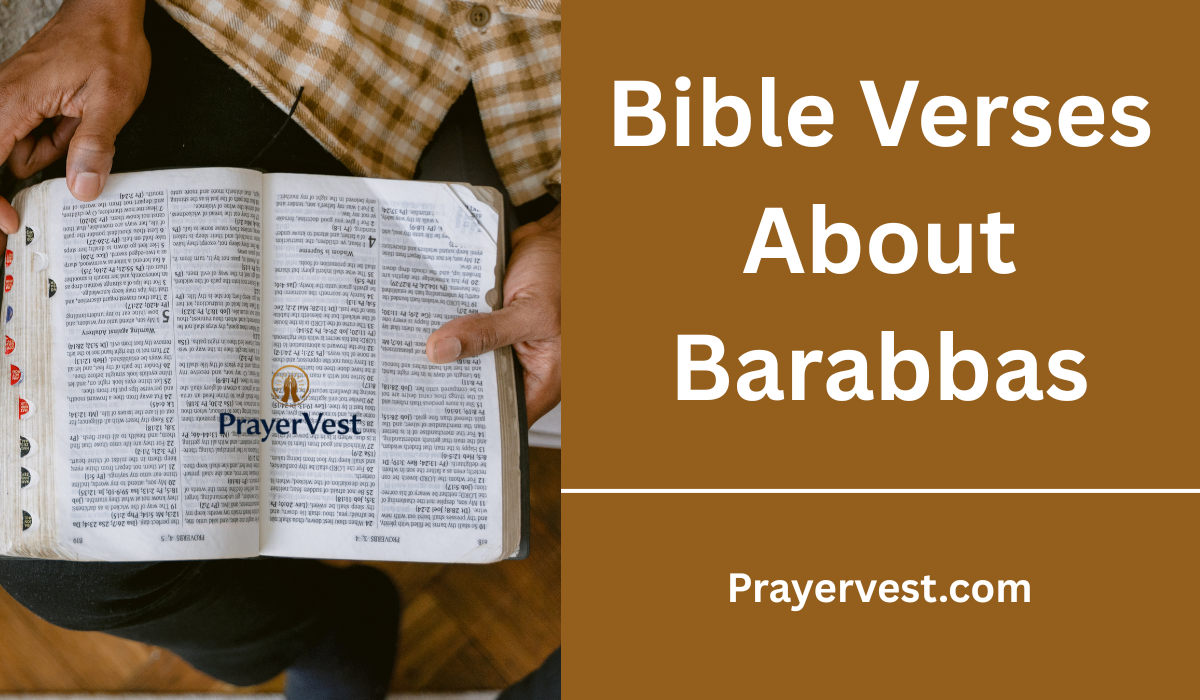One of the most fascinating and contentious characters in the New Testament story is Barabbas. He was a notorious prisoner who was selected by the mob to be freed in place of Jesus during the Passover custom, and he is mentioned in all four Gospels. When compared to the real Son of the parent, Jesus Christ, his name, which can mean “son of the father,” has a startling irony. A deeper spiritual narrative is revealed through this historical moment: the innocent are convicted and the guilty are set free.
The fundamental idea of the gospel is symbolized by the trade of Barabbas for Jesus. Scripture describes Barabbas as a murderer, rebel, and insurrectionist, but because Jesus took his place on the cross, he was set free. He stood in for humanity at that precise moment—broken, guilty, and deserving of punishment, but forgiven because of Jesus’ death. It is a potent illustration of grace that serves as a reminder that everyone can be saved.


Believers are prompted to confront important realities about justice, mercy, and substitutionary atonement by studying Bible scriptures regarding Barabbas. It pushes us to identify with the narrative and acknowledge that Jesus took our place in the same way that He took Barabbas’. We learn more about Christ’s amazing love and the freedom He bought for us via His suffering and sacrifice as we study these verses.
40 Inspiring Bible Verses About Barabbas (2026)
1. Matthew 27:16
“At that time they had a well-known prisoner whose name was Barabbas.”
This verse introduces Barabbas not merely as a minor character but as a “well-known” prisoner — a man whose reputation was widespread among the people. His fame, however, was stained by violence and rebellion. The gospel writers highlight this contrast intentionally: the notorious criminal beside the most righteous man to ever walk the earth. Barabbas’ role is not accidental; it represents the depth of humanity’s rebellion. He stands as a symbol of the fallen human condition — guilty, condemned, and deserving of judgment — yet he becomes the very one who will walk free because of Jesus. This introduction sets the stage for a powerful contrast between human sinfulness and divine grace: the guilty man released and the innocent Messiah bound.
2. Matthew 27:17
“So when the crowd had gathered, Pilate asked them, ‘Which one do you want me to release to you: Jesus Barabbas, or Jesus who is called the Messiah?’”
Pilate presents a direct and deliberate comparison: Barabbas versus Jesus. Two men stand side by side — both named Jesus, yet one defined by rebellion and the other by redemption. The question forces the crowd to make a moral and spiritual decision: the Christ who came to save them, or the insurgent who contributed to their oppression. Humanity’s paradox is revealed here — choosing a false liberator over the true One sent by God. The clash of kingdoms is on full display: one built on violence and resistance, the other on love and truth. This moment exposes the tragic reality of human priorities when blinded by sin.
3. Matthew 27:20
“But the chief priests and the elders persuaded the crowd to ask for Barabbas and to have Jesus executed.”
Here we see spiritual corruption at its peak. The very leaders called to uphold God’s law actively convince the crowd to choose darkness over light. Their persuasion reveals how manipulation and propaganda can corrupt justice. Barabbas becomes a pawn in a larger spiritual battle, illustrating how easily hearts can be turned away from the truth. The people did not ask for Barabbas because they truly wanted him — they were influenced by leaders driven by envy and fear. The verse demonstrates the spiritual blindness that comes when sin shapes our decisions instead of truth.
4. Matthew 27:21
“Which of the two do you want me to release to you?” asked the governor. “Barabbas,” they answered.”
The crowd’s response reveals the culmination of human brokenness — they choose rebellion over redemption. Their unified demand for Barabbas reflects the deeper reality that humanity often prefers the familiar chains of sin to the liberating truth of Christ. Barabbas’ freedom becomes a vivid picture of substitution: the guilty is pardoned while the innocent suffers. This exchange illustrates the heart of the gospel narrative — Jesus taking the place of sinners who deserve the punishment removed from them.
5. Matthew 27:22
“What shall I do, then, with Jesus who is called the Messiah?” Pilate asked. They all answered, “Crucify him!”
Their cry, “Crucify him,” echoes the universal human rejection of God’s reign. Though Jesus offered healing, hope, and salvation, the people chose death for Him to preserve their worldly expectations. Barabbas walks freely among them while the Savior is handed over to death. This moment reveals the devastating consequence of misplaced values: innocent holiness is silenced, and sinful rebellion is celebrated. The crucifixion verdict emphasizes the extreme nature of Christ’s sacrifice — taking on the condemnation that belonged to Barabbas, and ultimately, to all of us.
6. Matthew 27:23
“Why? What crime has he committed?” asked Pilate. But they shouted all the louder, “Crucify him!”
Pilate’s repeated questioning highlights the glaring absence of any legitimate accusation against Jesus. Even a pagan governor recognizes His innocence. Yet the crowd’s response grows louder, illustrating how emotion-driven hatred can overpower truth and justice. Barabbas benefits from this rising hostility — his release becomes possible only because irrational hatred toward Jesus reaches a fever pitch. This verse reveals the severity of human depravity: despite clear innocence, the righteous One is condemned to death while the guilty man is defended with aggression and blind rage.
7. Matthew 27:24
“When Pilate saw that he was getting nowhere, but that instead an uproar was starting, he took water and washed his hands…”
Pilate symbolically washes his hands to demonstrate innocence, yet internally he knows he is permitting a grave injustice. His attempt to absolve himself shows the human tendency to avoid responsibility for sin while participating in it indirectly. Meanwhile, Barabbas becomes a visible representation of the undeserving recipient of freedom purchased by the cowardice of human authority and the sacrificial love of Christ. Though Pilate washes his hands, Jesus will shed His blood — the only cleansing that truly removes guilt.
8. Matthew 27:26
“Then he released Barabbas to them. But he had Jesus flogged, and handed him over to be crucified.”
This is the moment of exchange — the heart of the Barabbas narrative. The guilty man’s chains are unlocked while the Innocent One is condemned. Jesus is not only sentenced but also beaten in Barabbas’ place. This dramatic transfer symbolizes substitutionary atonement: the righteous suffers; the unrighteous goes free. Barabbas’ release is a living picture of grace — unearned freedom offered at the expense of the sinless Savior.
9. Mark 15:6
“Now it was the custom at the festival to release a prisoner whom the people requested.”
This custom provided a legal avenue for substitution — setting one guilty prisoner free every Passover. The timing is prophetic: during the feast celebrating Israel’s deliverance, the ultimate deliverance is enacted. The system meant to show mercy becomes the means through which the ultimate act of grace is revealed. Barabbas becomes the living embodiment of the Passover theme — liberation through sacrifice.
10. Mark 15:7
“A man called Barabbas was in prison with the insurrectionists who had committed murder in the uprising.”
Mark emphasizes Barabbas’ violent crimes — not simply rebellion but murder. He was a threat to society. His imprisonment was justice rightly applied. Yet this deadly rebel becomes the one saved from execution. Scripture paints Barabbas as a representative of humanity under just condemnation — rebellion against God leading to spiritual death — yet offered release through Christ’s intercession.
11. Mark 15:8-9
“The crowd came up and asked Pilate to do for them what he usually did.”
The crowd eagerly expects mercy — but ironically, they request it for the least deserving among them. Pilate offers Jesus in an attempt to satisfy them, believing they would never choose a murderer over a miracle worker. But the unfolding events reveal that popular opinion is not aligned with righteousness. The desire for spectacle overtakes justice, ensuring that Barabbas — not Jesus — will receive the tradition’s mercy.
12. Mark 15:11
“But the chief priests stirred up the crowd to have Pilate release Barabbas instead.”
Religious leaders exploited their influence to manipulate public demand. Driven by envy, they twist justice for personal gain. Barabbas’ release emerges not from compassion but corruption. This verse exposes the danger of leaders who use authority to turn people away from the truth. In freeing Barabbas, they reject the very Messiah they had waited for, fulfilling prophecy while showcasing spiritual blindness.
13. Mark 15:12
“What shall I do, then, with the one you call the king of the Jews?” Pilate asked them.”
Pilate’s question once again forces a confrontation between truth and rebellion: what will they do with the King? By calling Jesus “your king,” Pilate highlights the irony — their rightful ruler is standing before them, yet they will refuse Him. Barabbas, a false liberator, is welcomed back into society while the True King is rejected.
14. Mark 15:13
“Crucify him!” they shouted.
The repeated shouts expose the terrifying power of collective sin. A mob mentality overtakes justice as righteousness is drowned in rage. Their cry ensures that Barabbas’ chains fall while Jesus’ hands are bound to the cross. The volume of their voices becomes the mechanism through which grace is delivered — though they intend evil, God intends salvation.
15. Mark 15:14-15
“Wanting to satisfy the crowd, Pilate released Barabbas to them.”
Pilate is swayed by the fear of unrest rather than guided by truth. Political convenience wins over integrity. Barabbas’ release is a result of human compromise — yet divinely ordained to fulfill the mission of the Lamb. Jesus takes the place of a murderer to restore murderers everywhere to life. Grace comes through human failure, not human righteousness.
16. Luke 23:18
“But the whole crowd shouted, ‘Away with this man! Release Barabbas to us!’”
Luke highlights the collective guilt — “the whole crowd.” They cry for the removal of Jesus and the return of a rebel. This dramatic reversal symbolizes how humanity consistently misidentifies its greatest need. They believe Barabbas brings freedom, yet Jesus alone offers true liberation. Their demand reveals the deception of sin — choosing bondage disguised as deliverance.
17. Luke 23:19
“(Barabbas had been thrown into prison for an insurrection in the city, and for murder.)”
Luke reinforces that Barabbas’ crimes were not minor — he was a violent offender deserving punishment. This detail intensifies the revelation of Christ’s substitution. The very worst among them is chosen over the very best. Barabbas stands as the epitome of criminal guilt, making his freedom an even greater display of divine grace.
18. Luke 23:20
“Wanting to release Jesus, Pilate appealed to them again.”
Pilate persists, hoping reason will conquer rage. He wants justice but is unwilling to enforce it. Barabbas’ name echoes through the crowd one more time as Pilate attempts to redirect them toward righteousness. His failure reveals the tragedy of weak leadership — unwilling to stand against wrong even when convinced of what is right.
19. Luke 23:21
“But they kept shouting, ‘Crucify him! Crucify him!’”
Their unrelenting cry shows a hardened rejection of the Savior. Every repetition of “Crucify him” is a stamp of approval on Barabbas’ freedom. Their shouting is the catalyst of substitution — Jesus will bear the violent criminal’s punishment so that violent criminals might be redeemed. Grace is unfolding through the voice of rejection.
20. Luke 23:22-23
“With loud shouts they insistently demanded that he be crucified, and their shouts prevailed.”
The final verdict falls not by truth but by the volume of sin. Their insistence prevails — and Barabbas walks free into a life he did not earn. This verse records the victory of human rebellion over earthly justice, yet the triumph of divine redemption over eternal judgment. Jesus’s condemnation becomes the doorway to undeserved pardon for a condemned man.
21. Luke 23:24-25
“So Pilate decided to grant their demand… He released the man who had been thrown into prison for insurrection and murder, the one they asked for, and surrendered Jesus to their will.”
Pilate’s final decision seals the shocking exchange: the murderer receives mercy while the Messiah suffers. This act of release, though driven by human compromise, is guided by divine purpose. Barabbas is entirely passive in his salvation — he contributes nothing yet receives everything. His pardon demonstrates the nature of grace: unearned, undeserved, and rooted in Christ’s sacrifice. Pilate “surrenders Jesus to their will,” yet ultimately, Jesus yields Himself to the will of the Father for the salvation of sinners like Barabbas.
22. John 18:39
“But it is your custom for me to release to you one prisoner at the time of the Passover. Do you want me to release ‘the king of the Jews’?”
John emphasizes the weight of Pilate’s question — he offers them their rightful King. The title “King of the Jews” highlights the absurdity of choosing Barabbas instead. The Passover context again underscores substitution: a lamb sacrificed so the guilty can go free. Here, Jesus becomes the ultimate Passover Lamb, ensuring that Barabbas’ deliverance is not merely political but symbolic of spiritual redemption offered to all humanity.
23. John 18:40
“They shouted back, ‘No, not him! Give us Barabbas!’ Now Barabbas had taken part in an uprising.”
The crowd explicitly rejects Jesus and embraces a rebel instead. Their cry of “Give us Barabbas!” reflects generational rebellion — choosing earthly revolt over heavenly redemption. John’s reminder that Barabbas participated in an uprising reinforces that he was no hero of justice; he was a guilty man given freedom in exchange for the righteous One’s condemnation. This rejection of Jesus reveals the staggering depth of God’s love — Christ saves even those who prefer their chains.
24. Acts 3:13-14
“You disowned the Holy and Righteous One… You asked that a murderer be released to you.”
Peter boldly confronts Israel with the horror of their choice: they rejected the Holy One and embraced a killer. This moment is not just historical but theological — it exposes the essence of sin: preferring death over life, darkness over light. Barabbas becomes a vivid picture of what Jesus came to redeem — hearts that violently oppose righteousness. Though the people disowned Christ, He did not disown His mission to save them.
25. Romans 5:8
“But God demonstrates his own love for us in this: While we were still sinners, Christ died for us.”
Barabbas’ story perfectly embodies this truth — he was not reformed or repentant when Jesus died in his place. Christ stepped into the judgment Barabbas deserved while Barabbas stood guilty without offering anything in return. This verse clarifies that salvation originates from God’s initiative, not human merit. Barabbas becomes a living illustration that Christ saves the ungodly while they remain hostile and unworthy.
26. 2 Corinthians 5:21
“God made him who had no sin to be sin for us, so that in him we might become the righteousness of God.”
Jesus, the sinless One, bears the full weight of sin so that sinners may be declared righteous. Barabbas becomes the first earthly beneficiary of this exchange — his deserved punishment transferred to Christ. He is the embodiment of this divine transaction: innocence traded for guilt, righteousness traded for wickedness. The criminal receives freedom while the Son accepts condemnation.
27. Galatians 3:13
“Christ redeemed us from the curse of the law by becoming a curse for us…”
Barabbas lived under the curse of the law — sentenced justly for his crimes. Yet Christ took that curse on Himself. The rebel is redeemed while the Redeemer is reviled. This verse reveals the legal exchange at work: the death sentence rests on Christ so that the condemned may be cleared. The cross transforms criminals into candidates for grace.
28. Isaiah 53:5
“But he was pierced for our transgressions, he was crushed for our iniquities.”
Centuries earlier, Isaiah prophesied the exact spiritual dynamic displayed between Jesus and Barabbas. The suffering Messiah bears the punishment of the guilty, offering peace and healing in return. Barabbas’ freedom is not the result of his rebellion but of Christ’s wounds. His story visually fulfills the prophecy — the punishment that brings deliverance falls upon the Innocent One.
29. Isaiah 53:6
“We all, like sheep, have gone astray… and the Lord has laid on him the iniquity of us all.”
Barabbas is one man, yet he represents all humanity. Like wandering sheep, we rebel against God’s rule. But Christ takes the punishment deserved by those who stray. This verse underscores the universality of sin and the completeness of Christ’s atonement — the iniquity of every Barabbas-like soul is transferred onto Him.
30. 1 Peter 3:18
“For Christ also suffered once for sins, the righteous for the unrighteous, to bring you to God.”
Barabbas’ release is the first earthly enactment of this principle — the righteous Jesus suffers so that an unrighteous man might go free. Christ’s suffering is not random injustice — it is purposeful redemption. The rebel’s liberation reveals God’s mission: not merely to forgive, but to bring sinners into relationship with Him.
31. 1 Peter 2:24
“He himself bore our sins in his body on the cross…”
The sins of Barabbas — murder, rebellion, pride — were placed upon Jesus as He walked toward Calvary. The physical act of crucifixion reflects a deeper spiritual reality: Christ carries every weight of guilt that condemned humanity. Barabbas leaves his prison cell unburdened because Jesus becomes burdened in full.
32. Hebrews 10:10
“We have been made holy through the sacrifice of the body of Jesus Christ once for all.”
The freedom of Barabbas signals the permanence and power of Christ’s sacrifice. His liberation was not conditional or partial — it was complete. Christ’s offering does not merely delay judgment; it abolishes it. Barabbas walks free into a new reality, symbolizing the holiness granted to those who trust in Christ’s finished work.
33. Colossians 1:14
“…in whom we have redemption, the forgiveness of sins.”
Redemption means “to be bought back,” and Barabbas becomes the first physical manifestation of this truth in the crucifixion narrative. His forgiveness was embodied in his release — not earned but granted through Christ’s captivity. His story reflects the spiritual reality that every believer experiences: forgiven because Jesus paid the price.
34. Titus 3:5
“He saved us, not because of righteous things we had done, but because of his mercy.”
Barabbas did nothing to receive salvation — he was chosen for release while still in his crimes. This verse highlights that salvation is driven by God’s mercy, not human worthiness. The shocking grace shown to Barabbas becomes a visual sermon demonstrating that God rescues sinners precisely when they least deserve it.
35. John 1:29
“Behold, the Lamb of God, who takes away the sin of the world!”
Barabbas’ freedom is the first visible example of Jesus taking someone’s sin and punishment upon Himself. The Lamb of God walks toward execution so a wolf-like criminal may walk free. Barabbas becomes a symbol of worldwide redemption — Jesus takes away not just one man’s sin, but the sin of the world.
36. Romans 3:24
“…and all are justified freely by his grace through the redemption that came by Christ Jesus.”
Barabbas is the picture of justification — declared free while still undeniably guilty. His acquittal illustrates that grace is God’s gift, not earned privilege. The courtroom exchange that spared Barabbas mirrors the spiritual justification given to all who accept Christ’s redemptive act.
37. Ephesians 1:7
“In him we have redemption through his blood, the forgiveness of sins, in accordance with the riches of God’s grace.”
The blood Jesus shed — the very blood intended for Barabbas’ execution — becomes the source of forgiveness and redemption. Barabbas’ life, spared at great cost, testifies to the immeasurable riches of God’s grace. The criminal leaves his chains behind because Christ willingly took them upon Himself.
38. Hebrews 2:9
“…so that by the grace of God he might taste death for everyone.”
Jesus experiences the death that belonged to Barabbas. The grace of God is revealed not in sparing Jesus but in exchanging His life for the lives of the guilty. Barabbas becomes proof that Christ’s suffering was inclusive — He died not for the righteous but for every sinner deserving punishment.
39. Psalm 85:10
“Mercy and truth are met together; righteousness and peace have kissed each other.”
The release of Barabbas represents the intersection of God’s justice and mercy. Truth demanded punishment, yet mercy provided substitution. Righteousness did not ignore sin — it paid for it. Peace is granted not by excusing guilt, but by transferring it to the One who bears it willingly.
40. Revelation 1:5
“To him who loves us and has freed us from our sins by his blood.”
Jesus’ sacrifice provides freedom to sinners bound in spiritual captivity. Barabbas’ undeserved release is a foretaste of the freedom Christ offers to all who believe. His story concludes not with judgment but with liberation — authored by the love and blood of the Savior who took his place.
Conclusion
The narrative of Barabbas is a vivid illustration of the gospel message rather than merely a historical incident. Every lyric that speaks of his release makes us think of a heavenly exchange in which the guilty are let free while the innocent are punished. Scripture uses Barabbas to show how Jesus voluntarily took on the punishment we deserved in order to grant us freedom and life. This poignant moment highlights the extent of Christ’s sacrifice and the depth of His love.
We are urged to see ourselves in Barabbas’ shoes as we consider these biblical passages—broken, imperfect, yet saved by grace. The narrative inspires us to react with thankfulness, faith, and a fresh resolve to follow the One who delivered us. May the story of Barabbas serve as a constant reminder that no life is beyond the grasp of God’s redemptive power and that no sin is too big for His mercy.






